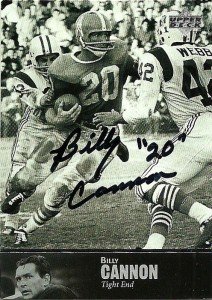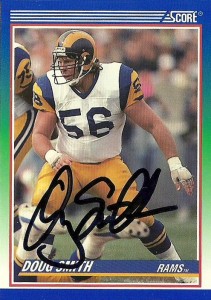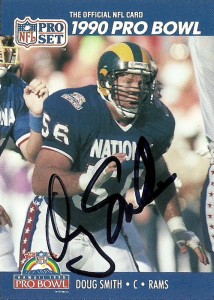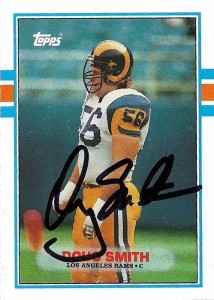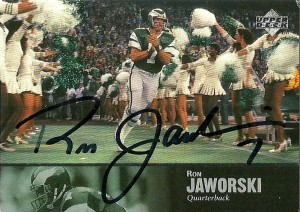 Cards: Upper Deck Legends 1997, Score Supplemental 1989, Topps 1984
Cards: Upper Deck Legends 1997, Score Supplemental 1989, Topps 1984
Acquired: TTM 2013, C/o Home
Sent: 1/2 Received: 1/23 (21 days)
Ron “Jaws” Jaworski, is a famous commentator and color man for the eponymous sports network ESPN, but before most of the recent generation of fans recall, he was a great quarterback story that unfolded in the City of Brotherly Love, – Philadelphia.
Well we have to go back even before that to where the tale of ‘the crossroads of quarterbacks’, Ron Jaworski begins. Youngstown State isn’t exactly a household name when it comes to football – and in fact is more well known for the Ward Beecher Planetarium more than anything else. The Penguins though played in a hybrid offense called the side-saddle T formation (where the quarterback stood off center and faces a sideline with two runningbacks and a wingback in motion). Ron played for them from 1969 through 1972 setting multiple records and ranking among the school’s leaders in 11 offensive categories.In his senior season Ron was ranked 5th in the country among college-division passers. He finished his career at Youngstown with 32 TDs, on 325 completions, and 4,612 yards.
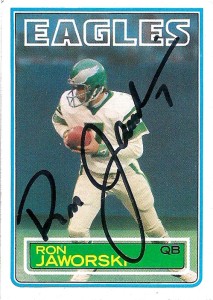 The Los Angeles Rams selected Ron in the second round of the 1973 draft. The draft proved to hold a bevvy of talent for the franchise, as Fred Dryer, Cullen Bryant, and Jim Youngblood were drafted alongside Jaworski. A young offensive backfield guy named Dick Vermeil noticed, “Ron’s raw talent and eagerness to learn,” and with the torch passed on from Roman Gabriel to John Hadl, there was room on the roster for Jaworski to be brought up to speed. He’d get some mop up duty in 1974 and start his first game in 1975, creating a frenzy when he led the team to a playoff win after the season. Handed the job in 1976, he went 2-0, but threw 1 TD to 5 picks. He’d lose the starting job to Pat Haden who went 5-1-1 the rest of the way. The Rams put Jaworski on the table for a trade, after Ron refused to sign. You see the Rams ownership didn’t feel that Jaworski was an ‘LA kind of kid’ but Ron thought he could start. He just wasn’t in the ‘Hollywood cool’ image. The long suffering Philadelphia Eagles franchise decided to come to the trough and made the call in March. (The Rams later signed Hollywood friendly free agent quarterback Joe Namath in May.)
The Los Angeles Rams selected Ron in the second round of the 1973 draft. The draft proved to hold a bevvy of talent for the franchise, as Fred Dryer, Cullen Bryant, and Jim Youngblood were drafted alongside Jaworski. A young offensive backfield guy named Dick Vermeil noticed, “Ron’s raw talent and eagerness to learn,” and with the torch passed on from Roman Gabriel to John Hadl, there was room on the roster for Jaworski to be brought up to speed. He’d get some mop up duty in 1974 and start his first game in 1975, creating a frenzy when he led the team to a playoff win after the season. Handed the job in 1976, he went 2-0, but threw 1 TD to 5 picks. He’d lose the starting job to Pat Haden who went 5-1-1 the rest of the way. The Rams put Jaworski on the table for a trade, after Ron refused to sign. You see the Rams ownership didn’t feel that Jaworski was an ‘LA kind of kid’ but Ron thought he could start. He just wasn’t in the ‘Hollywood cool’ image. The long suffering Philadelphia Eagles franchise decided to come to the trough and made the call in March. (The Rams later signed Hollywood friendly free agent quarterback Joe Namath in May.)
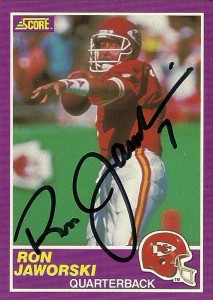 Dick Vermeil liked what he saw out of ‘The Polish Rifle’ back when he was an assistant with the Rams, and now as head coach was more than happy to bring Ron on board in 1977 (where he’d ironically take the place of Roman Gabriel.) Mentored by guru Sid Gillman and Vermeil, Ron made titanic strides in 1978 and guided the Eagles into the playoffs with a 9-7 record. He’d beat his numbers in 1979 posting 18 TDs to only 12 picks, and the team surged to an 11-5 record as his exuberance, leadership, and fun-loving nature infected teammates and Eagles fans alike. Jaworski bettered himself again in 1980, with a 12-4 record guiding the team to the Superbowl XV against the Oakland Raiders. After the season, ‘Jaws’ 27 TDs to 12 Ints and 3529 yards, was good enough to earn him the 1980 NFL MVP honor. Ron continued to prove his detractors wrong, winning more games as a quarterback from 1978-1981 (with the exception of Terry Bradshaw). After the Eagles slipped back under the playoff surface again in 1982, Dick Vermeil decided to quit coaching and handed the reins over to his longtime defensive coordinator Marion Campbell. By 1985 the writing was on the wall with the drafting of wonder quarterback Randall Cunningham who started 4 games that year. Still, Jaws managed to pop a memorable 99 yard touchdown to Mike Quick that season. In 1986, firey Buddy Ryan was brought in to right the ship in Philadelphia, and by the 11th game of the season decided that the era of Ron Jaworski was over for the Eagles. Unceremoniously dumped after the season, Jaws headed over to Miami to back up Dan Marino where he’d play sparingly in 1988. Ron kept it up another year and closed out his career with the Chiefs as Steve DeBerg’s back up in 1989, at the grand old age of 38. (Bizarrely during the 1991 season, Jaworski had to turn down appeals from Eagles fans to return to Philadelphia after Cunningham and backup Jim McMahon were injured.)
Dick Vermeil liked what he saw out of ‘The Polish Rifle’ back when he was an assistant with the Rams, and now as head coach was more than happy to bring Ron on board in 1977 (where he’d ironically take the place of Roman Gabriel.) Mentored by guru Sid Gillman and Vermeil, Ron made titanic strides in 1978 and guided the Eagles into the playoffs with a 9-7 record. He’d beat his numbers in 1979 posting 18 TDs to only 12 picks, and the team surged to an 11-5 record as his exuberance, leadership, and fun-loving nature infected teammates and Eagles fans alike. Jaworski bettered himself again in 1980, with a 12-4 record guiding the team to the Superbowl XV against the Oakland Raiders. After the season, ‘Jaws’ 27 TDs to 12 Ints and 3529 yards, was good enough to earn him the 1980 NFL MVP honor. Ron continued to prove his detractors wrong, winning more games as a quarterback from 1978-1981 (with the exception of Terry Bradshaw). After the Eagles slipped back under the playoff surface again in 1982, Dick Vermeil decided to quit coaching and handed the reins over to his longtime defensive coordinator Marion Campbell. By 1985 the writing was on the wall with the drafting of wonder quarterback Randall Cunningham who started 4 games that year. Still, Jaws managed to pop a memorable 99 yard touchdown to Mike Quick that season. In 1986, firey Buddy Ryan was brought in to right the ship in Philadelphia, and by the 11th game of the season decided that the era of Ron Jaworski was over for the Eagles. Unceremoniously dumped after the season, Jaws headed over to Miami to back up Dan Marino where he’d play sparingly in 1988. Ron kept it up another year and closed out his career with the Chiefs as Steve DeBerg’s back up in 1989, at the grand old age of 38. (Bizarrely during the 1991 season, Jaworski had to turn down appeals from Eagles fans to return to Philadelphia after Cunningham and backup Jim McMahon were injured.)
For a guy who the Rams couldn’t stand because he didn’t fit their scene (4-0 record as a starter), the criticism he took for not being able to get to the big game (4 playoff wins, superbowl appearance), and the belief he’d never make it out of tiny Youngstown State (15 seasons in the NFL), Ron Jaworski is a great story about a kid who decided to chase his dreams so that he wouldn’t have to straighten metal bars in a factory and play a game he loved for the rest of his life. At the time of his retirement, Jaworski held the NFL record for most consecutive starts with 116, (since surpased by Brett Favre, Peyton Manning, and Eli Manning).
Ron is a popular name in the sport of American Football. He is a fixture at ESPN, spent 5 years on Monday Night Football, has been involved with youth football, expanding the sport for many years investing overseas in a variety of football ventures, and is part owner of the AFL Philadelphia Soul. Jaws has been nominated for the NFL Hall of Fame, and in 1992 was inducted into the Eagles Honor Roll. You can visit him at ronjaworski.com.
Att 4117 Comp 2187 Yds 28190 Pct 53.1% Td 179 Int 164 Rat 72.8
Rush 257 Yds 859 Avg 3.3 Td 16 Lg 44
